

Enough of the Emails: Is Resistance Futile? Information overload causing major headache for IC professionals [video] ‘Noise, noise, and more noise’ - That’s the biggest headache facing Internal Communication (IC) experts today according to delegates at the IABC World Conference (International Association of Business Communicators), June 2016, New Orleans.
![Information overload causing major headache for IC professionals [video]](http://cdn.pearltrees.com/s/pic/th/information-professionals-133719289)
SnapComms interviewed several IC experts to hear first-hand about their biggest challenge, and the ubiquitous problem of employees not listening, aka information overload. Sarah Perry, CEO at SnapComms, summarises their comments: “Key company messages are getting drowned out. There’s so much other content competing for employees’ time. The Catch-22 of E-Mail. The global workplace changed forever when e-mail as a communication medium was introduced in the early 1990s.
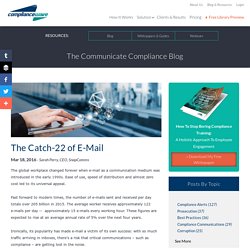
Ease of use, speed of distribution and almost zero cost led to its universal appeal. Fast forward to modern times, the number of e-mails sent and received per day totals over 205 billion in 2015. The average worker receives approximately 122 e-mails per day -- approximately 15 e-mails every working hour. These figures are expected to rise at an average annual rate of 5% over the next four years. Ironically, its popularity has made e-mail a victim of its own success: with so much traffic arriving in inboxes, there’s a risk that critical communications – such as compliance – are getting lost in the noise. Increasingly, staff are suffering from "infobesity," finding it difficult to understand an issue due to information overload. Communication experts maintain that the e-mail format will continue to be popular, but more dynamic and engaging styles of message delivery are needed.
Reduce email overload and catch staff attention. Italy: Company trials email-free working to cut stress. Image copyright Gabel An Italian company has told staff to refrain from sending any internal emails for a week in an effort to reduce stress levels.
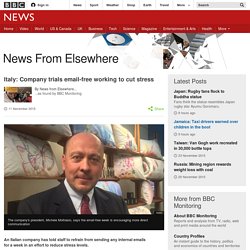
Home textiles company Gabel, based in the northern Como region, commissioned an expert to interview its employees about what their main concerns were at work, the local La Provincia di Como website reports. Many said that managing the huge volume of internal correspondence was a burden during the working day. Overcome these four email challenges…and transform your internal communications - Communication World. Even with the proliferation of channel choices, email continues to have importance and value in the social age.
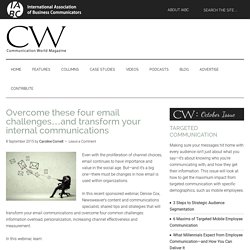
But—and it’s a big one—there must be changes in how email is used within organizations. In this recent sponsored webinar, Denise Cox, Newsweaver’s content and communications specialist, shared tips and strategies that will transform your email communications and overcome four common challenges: information overload, personalization, increasing channel effectiveness and measurement. In this webinar, learn: What real insight and measurement looks like—and how to prove ROI to your organization.How to cut through inbox clutter—and stand out in the inbox.How to increase engagement through personalization and content targeting.The types of email communications that really connect with each employee.
Access the free on-demand webinar here. Caroline Cornell Caroline Cornell is associate editor for IABC’s content department. Inbox Zero vs. Inbox 5,000: A Unified Theory. For some, it’s a spider.
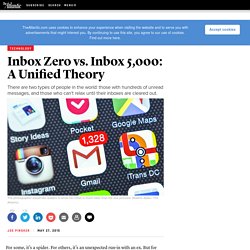
For others, it’s an unexpected run-in with an ex. But for me, discomfort is a dot with a number in it: 1,328 unread-message notifications? I just can’t fathom how anyone lives like that. Compelling facts about email (ab)use in organizations. It has almost become a truism that the average corporate employee spends around 25-30 percent of the workday on email related tasks.
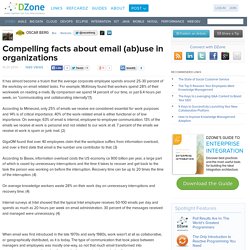
For example, McKinsey found that workers spend 28% of their workweek on reading e-mails. By comparison we spend 14 percent of our time, or just 6.4 hours per week, on "communicating and collaborating internally. "(1). According to Mimecast, only 25% of emails we receive are considered essential for work purposes and 14% is of critical importance. 40% of the work-related email is either functional or of low importance.
Everyone hates email. Here's what could replace it. Last summer, employees at Treehouse, a 70-person company that offers online courses in writing code and developing apps, felt workflow was frustratingly inefficient.

On the one hand, people were pushing work onto each other, so individuals were spending too much time answering colleagues and not enough on their own work. On the other, information was siloed, so if you needed some information, you were forced to bug other people to get it. The problem? Email. Their solution? "Everyone was so relieved," says Treehouse CEO Ryan Carson. Although there are only a third as many business email accounts as consumer accounts -- 929 million as opposed to 2.97 billion in 2013 -- the majority of email traffic comes from the business world, according to Radicati, an email and communications research firm.
Bitrix24 Study Shows Decline of Email as Primary Tool for Internal Communications and Collaboration. 10 Rules to Make email Within Teams More Efficient. You don’t need an interoffice communications manual to get people to communicate better.
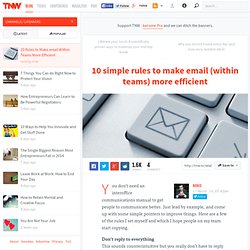
Just lead by example, and come up with some simple pointers to improve things. Here are a few of the rules I set myself and which I hope people on my team start copying. Don’t reply to everything This sounds counterintuitive but you really don’t have to reply ‘Thanks’, ‘Got it’ or ‘Let me get back to you on that’ to every email. When I ask you a question feel free to not answer until you know the reply. If it is a simple FYI just consider yourself informed. Infographic-defrost-the-frozen-middle.jpg (JPEG Image, 885 × 3983 pixels) - Scaled (25%) Companies Are Banning E-mail to Improve Efficiency. Un-Lean Email. As process excellence professionals we are constantly looking at ways to improve the flow and consistency of process, to simplify and streamline things.
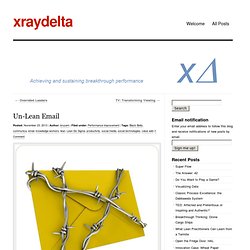
Yet the days of most people, including improvement professionals, remains cluttered and blocked by un-lean communication practices especially email. According to McKinsey Global Institute, the typical worker spends 28% of their work-week dealing with email (plus the time spent after hours checking email). In addition, most people have accumulated several email accounts, some active, some long dormant, some forgotten. The McKinsey Global Institute and International Data Corp. study found that email is the second-most time-consuming activity for workers, next to “role-specific tasks.” The McKinsey Global Institute finds that twice as much potential value lies in using social tools to enhance communications, knowledge sharing, and collaboration within and across enterprises.
Other findings cited in the report includes: Reducing the Role of Email in Organizations: Change is Overdue. Summary: Although social technology advocates have been calling for the death of email for several years, it's still the dominant digital channel by which people in organizations communicate and collaborate.
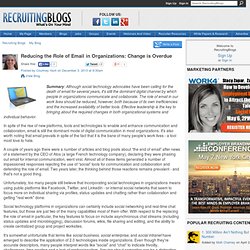
The role of email in our work lives should be reduced, however, both because of its own inefficiencies and the increased availability of better tools. Effective leadership is the key to bringing about the required changes in both organizational systems and individual behavior.
New Research Reveals Banning Email in the Workplace Wrong Approach to Email Overload. CHICAGO, June 8, 2012 /PRNewswire/ -- A trend among global companies that eliminates or limits internal email to employees is a misguided strategy, based on research released today by The Grossman Group, a communications consultancy, and LCWA Research Group. Results of the 2012 Work-Related Email Perception Study, "Enough Already! Stop Bad Email," show that while middle managers typically spend 2.5 work weeks (100 hours) a year on irrelevant email, they don't want their ability to use email taken away or interrupted at any time of the day or night.
They do, however, want policies that could help reduce the overwhelming volume of irrelevant email. Re: group emails and why they’re a scourge. PLEASE READ. Lucy Adams, the BBC’s former head of human resources, has apologised for her group emails to the corporation. An employee in the BBC’s newsroom said they were “crap” and that she should get someone else to write them for her.
The sad thing was that she already had someone else writing them for her. In fact she had a whole team of people writing, checking and correcting them. In defense of email. As internal communicators, "Nobody else can bring the organisation together in a way that makes sense," according to RockstarComms' Ian Harris. The perfect vehicle to help do this is email. It's 'simply' his opinion. By Ian Harris.
Tackling email overload and creating better internal communication habits. Sophia Cheng caught up with David Grossman, CEO of The Grossman Group, to chat about the ever-hot topic of email overload. Expect the email backlash to continue well into 2012. By Sophia Cheng In our one-on-one interview, Grossman discusses the effects of overuse of the popular internal communications channel, the best times to use it, and also introduces his 2012 Workplace Diet: how to tackle ineffective communication by breaking issues down and targeting them one by one, month by month. SC. ‘Zero E-mail’ and Change Management: An Internal Communication Opportunity? « INTRASKOPE – INTERNAL COMMUNICATION VIEWPOINT FROM INDIA. There are reports of Atos, a French organization planning to do away with e-mail in the near future.
That near future is around the corner. Maybe Turning Off Email Is Catching On. Email is Dead. Long live Email! The Vehicle Formerly Known as Email. We Have to Fix E-Mail.